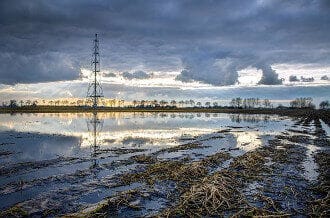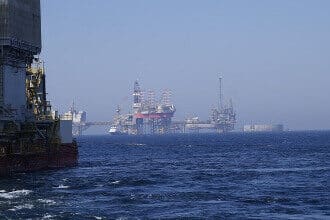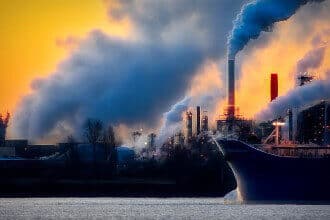By Sydney Cohen – This is a question that many people are beginning to ask. It is known that many natural resources are not infinite, and they will run out at some point. According to a Stanford University research team, it is predicted that “the world’s oil reserves will run out by 2052, natural gas by 2060 and coal by 2090.”
However, oil companies have historically continued to find more and more deposits of oil. Even though oil is a dwindling resource, used in exorbitant amounts every day, miraculously we have come very far in technologies that allow us to continue to find oil.
In considering the environmental outcomes of burning oil, and the release of greenhouse gases into the atmosphere that rapidly accelerate climate change, a more important question to consider is not whether we will run out of oil, but rather, how much oil can we burn and still have a livable planet for humanity and 8 million other species?
Scientists have published what they call a carbon budget for humanity, and unfortunately, we are fast approaching the end of that budget.
Continue reading to learn more about this limited resource, how we can burn oil and still preserve our planet, and what the carbon budget predicts!
What are Fossil Fuels and Why is Burning them Problematic?
According to the Natural Resources Defense Council (NRDC), “coal, crude oil, and natural gas are all considered fossil fuels because they were formed from the fossilized, buried remains of plants and animals that lived millions of years ago. Because of their origins, fossil fuels have a high carbon content.”
Burning fossil fuels releases carbon dioxide and other greenhouse gases into our planet’s atmosphere. When sunlight gets trapped under this layer of gases, our planet warms up, which is known as climate change, or global warming.
Although many countries are actively pursuing alternative fuel sources, the global demand for energy rises. Global Energy and CO2 Status Reports show that the energy demand in the world and the global consumption of fossil fuels has increased by a record 1.5%. For that reason, nations have retreated toward fossil fuels.
More than 70 percent of the global growth in electricity and gas demand has been achieved through the extraction and use of oil, coal, and other natural gas.
Natural Gas and Crude Oil
According to the US Energy Information Administration, natural gas “is a fossil energy source that formed deep beneath the earth’s surface. Natural gas contains many different compounds. The largest component of natural gas is methane, a compound with one carbon atom and four hydrogen atoms (CH4).”
“Natural gas withdrawn from natural gas or crude oil wells is called wet natural gas because, along with methane, it usually contains NGLs—ethane, propane, butanes, and pentanes—and water vapor.” Natural gas is in high demand. “Natural gas accounted for 40% of total utility-scale U.S. electricity generation by all sectors in 2020. The industrial sector uses natural gas as a fuel for process heating, in combined heat and power systems, as a raw material (feedstock) to produce chemicals, fertilizer, and hydrogen, and as lease and plant fuel.”
Crude oil is perhaps the most important component in oil production. “Crude oil is a naturally occurring petroleum product composed of hydrocarbon deposits and other organic materials. A type of fossil fuel, crude oil is refined to produce usable products including gasoline, diesel, and various other forms of petrochemicals. It is a nonrenewable resource, which means that it can’t be replaced naturally at the rate we consume it and is, therefore, a limited resource.”
World’s Oil Supply
The world does not have an unlimited supply of proven oil reserves. As mentioned, we are facing a double-sided crisis. The world relies upon fossil fuels as energy sources. However, the burning of fossil fuels also causes the warming of our planet. This is why we must find alternative energy solutions that allow us to both preserve oil and our planet.
The American Petroleum Institute (API) provides estimations for “the total number of wells and footage drilled” on a quarterly basis. The American Petroleum Institute estimated in the second quarter of 2018 that there had been a “265 percent increase in estimated exploratory gas well completions as compared to the second quarter of 2017,” demonstrating “the continued growth and strength of U.S. energy production.”
What is Peak Oil?
Peak oil is described as “the moment at which extraction of petroleum reaches a rate greater than that at any time in the past and starts to permanently decrease.” It is relevant to understand this limited resource, and “while global petroleum reserves are finite, the limiting factor is not whether the oil exists but whether it can be extracted economically at a given price.”
How much oil we have left depends on the wells that have reached peak oil. All the oil wells in existence reach peak oil at some point, and then the oil extraction begins to decline.
What is the Carbon Budget?
The world’s carbon budget is a report that was released by the Intergovernmental Panel on Climate Change (IPCC) in August 2021. The carbon budget estimates that “the residual global carbon budget to remain within 1.5°C global warming with 66% probability is given as 400 billion tonnes CO2 from the start of 2020. With the world population reaching 8 billion people within the next few years, this is 50 tonnes per person. Global CO2 emissions are about 36 billion tonnes per year, so the 400 billion tonnes will last just 11 years if no reductions are made.”
Therefore, the global carbon budget runs out at the end of 2030.
Religion and Oil
By extracting and burning through oil more and more quickly, we are rushing to make the most of this limited resource, without putting enough thought into considering the consequences. The consequences of our prioritization of speed and profit over prudence in oil extraction are explored in Eco Bible Volume 1. Here’s a poignant excerpt on this topic from the essay “How Fast We Move”:
Rabbi Shaul David Judelman teaches: “Thus the paths of Esau and Jacob split. We must learn the lesson that Jacob tries to give Esau: that the considerations for our children and animals must also determine the pace of our travel. We must find sustainable vessels for our tremendous creative abilities. When we consider how to act in the moment at hand, our attention must focus on our shared futures on this earth, and we must remember to make responsible decisions in accordance with this reality.”
Here, we see the brothers’ different views: Esau with his rapid pace, and Jacob with patience to accommodate the needs of his children and nursing flocks and cattle. According to the Midrash, Esau’s offspring become Rome, and more broadly, Western civilization. In recent centuries, the West has promoted a pace of life much faster than in pre-modern societies.
We can relate this verse to how the rate of technological change today is occurring faster than our conscious ability to consider its implications. One example is the BP oil spill. Federal investigators found that the companies BP, Halliburton, and Transocean acted in haste in trying to complete the cementing of the oil well, which was weeks behind schedule. Due to the great depth of the drilling, it took engineers 87 days to stop the oil spill, although it continued to leak for years. BP’s Deepwater Horizon rig drilled and spilled at a depth of 18,360 feet, in 5,100 feet of water, which shows what happens when humans lose control. A 2020 study found that the extent of the spill was much greater than commonly thought. Ten years after the spill, oil drilling has moved further offshore and deeper underwater. The bipartisan National Commission on the BP Deepwater Horizon Oil Spill and Offshore Drilling “accused Congress of a near-complete failure to adopt their recommendations on drilling safety.” New oil wells at even greater depths are now operating near the site of the BP Macondo well that spilled.
In deep water or high in the air, in particular, the process of moving too fast can be catastrophic. At a global level, a humanity that is moving too fast is generating a global ecological crisis.
* Featured image source





